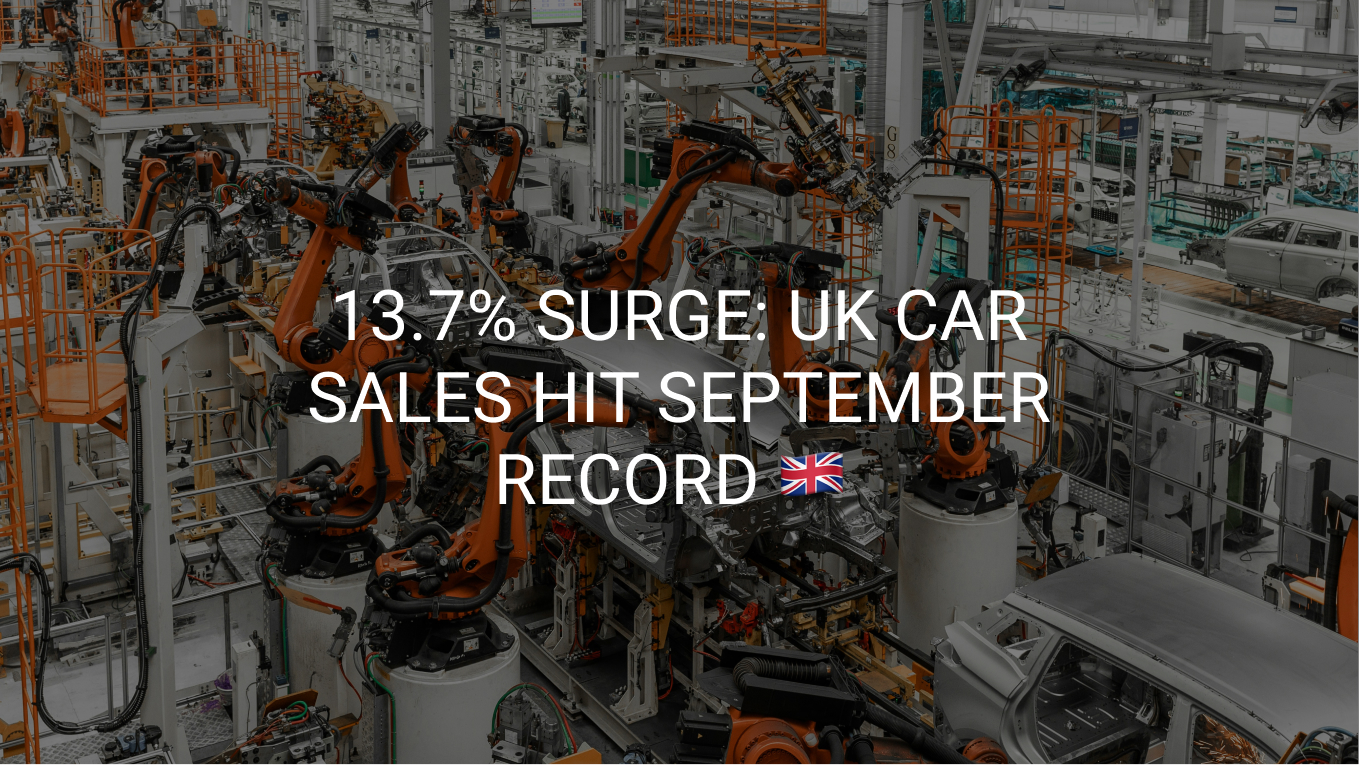UK car sales soar, with electric car sales hit record and a record high in September
 21.10.2025
21.10.2025
 4 mins to read
4 mins to read

After months of setbacks and uncertainty, the UK car industry has delivered a pleasant surprise: the new car registrations rose by 13.7% in September 2025 to 312,891 units. This leap not only marks the strongest September since 2020. It also offers a much-needed lifeline to one of Britain’s most critical industrial sectors. But what lies behind this rebound? Is it just a fleeting uptick in a turbulent market or sustainable growth? Explore what government data and industry experts reveal about the real state of UK car manufacturing. The real story goes far deeper than a single month’s results.
A surprising buck in the trend — what is behind the sales hit record?
The surge is striking, given the challenges that have plagued the industry. In August 2025, vehicle output collapsed by 18.2% to just 38,693 units, partly due to a cyberattack at Jaguar Land Rover (JLR) that severely disrupted production lines. At the same time, UK manufacturing more broadly shrank at its fastest pace in five months. Yet despite these setbacks, September output defied expectations. What is behind the surge? The real momentum came from electrified vehicles.
Turning Point in car sales: EVs record high in september
Electric or hybrid cars constituted more than half (50.8%) of all new cars registered in September 2025. That is an all-time high for this type of vehicle. The breakdown includes:
- battery electric vehicle (BEV) registrations surged 29.1% to 72,779 units, the highest monthly volume ever;
- plug-in hybrids (PHEVs) jumped 56.4% to 38,308 units;
- hybrids (HEVs) rose 23.5% to 47,885 units.”
Together, these powertrains made up the majority of all new registrations for the first time. It is a milestone that signals how fast the transition is accelerating.
UK car market snapshot: key data at a glance
| Segment / Powertrain | Registrations | % Change vs 2024 | Market Share (2025) | Key Insight |
| Battery EV (BEV) | 72,779 | +29.1 % | 23.3 % | Record monthly volume; demand lifted by Electric Car Grant |
| Plug-in Hybrid (PHEV) | 38,308 | +56.4 % | 12.2 % | Fastest-growing category, driven by fleet buyers |
| Hybrid (HEV) | 47,885 | +23.5 % | 15.3 % | Continues to bridge combustion and full EV segments |
| Petrol | 141,310 | +2.4 % | 45.2 % | Growth slows as buyers shift to electrified models |
| Diesel | 12,609 | –28.2 % | 4.0 % | Ongoing structural decline |
| Total Market | 312,891 | +13.7 % | — | Strongest September since 2020 |
This mix of growth and decline shows a market in transition: petrol cars still dominate by volume, but electric and hybrid models are setting the pace. The balance has tipped: electrification is no longer a niche; it is the majority.
Where did the record number of evs come from?
For carmakers and their suppliers, September’s jump in output is a welcome breather, showing that the industry can still bounce back when conditions improve. For the government, the result offers evidence that new incentives — notably the Electric Car Grant introduced in 2025 — are working. The scheme, which currently applies to about 25% of available BEV models, has helped make electric cars more affordable and accelerated demand in both private and fleet markets. The question arises: is such an impressive recovery secure? Manufacturers continue facing global supply-chain constraints and rising energy costs. While the surge in electric models is encouraging, SMMT warns that private buyers still account for fewer than one in four BEV registrations, underlining the need for lasting consumer confidence and infrastructure investment.
How to maintain electric car sales hit?
While September’s surge is encouraging, it arrives after a tough year. In 2024, UK vehicle production fell by 11.8%, with output slipping below one million units (905,233) as the industry struggled with factory transitions and softer demand. Yet signs point to recovery: the new car market is up 4.2% year to date, and battery electric vehicle (BEV) share has risen to 22.1%. Looking ahead, sustained growth will depend on four key factors:
- stronger domestic and export demand;
- a smoother transition to zero-emission models;
- robust trade stability;
- long-term investment in automation and green innovation.
Takeaway on new car sales surge
The record 13.7 percent jump in September registrations is more than just a statistic. It is both a powerful reminder of what the British automotive industry can achieve and a warning of how fragile that success may be. The rebound shows that the sector can still rally under pressure. However, it also exposes just how vulnerable it remains to global shocks, shifting trade rules, and the costly march towards electrification. The real question is whether this surge marks the beginning of a genuine recovery or merely a temporary spark before another slowdown. The answer will depend on how effectively the industry navigates technological change, geopolitical uncertainty, and the race to develop a future centered on electric vehicles. One thing is certain: we will be following these developments closely and reporting on how the story unfolds.
Sources:
https://www.reuters.com/world/uk/uk-manufacturing-shrinks-fastest-pace-5-months-pmi-shows-2025-10-01
https://www.smmt.co.uk/september-new-car-market-delivers-record-number-of-evs/






